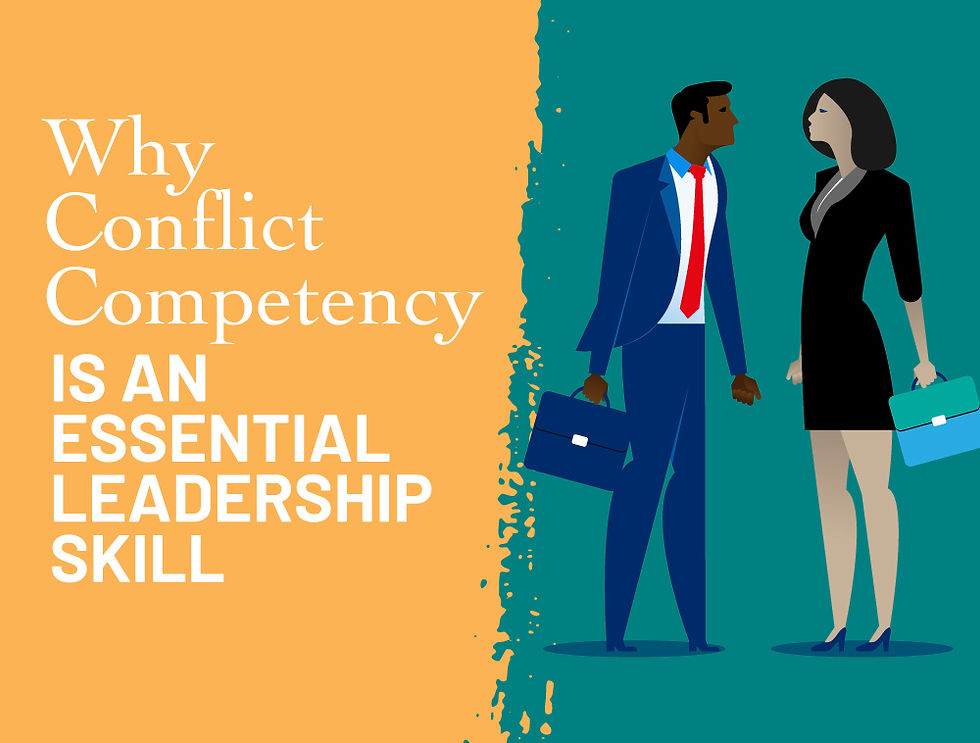From Firefighting to Foresight: Creating a Proactive Conflict Engagement Culture
- Dr. Robyn Short

- Jul 10, 2025
- 3 min read
Updated: Aug 7, 2025
Tired of conflict firefighting? Learn how to practice conflict engagement proactively — shifting your culture from reactive crisis response to early, skillful, and relationship-centered resolution.

For many organizations, conflict feels like a series of fires — each one demanding immediate attention, draining energy, and leaving leadership scrambling for resolution. It’s exhausting. And it’s a symptom of a deeper issue: a reactive conflict culture.
In reactive cultures, conflict is only addressed when it erupts. Conversations are avoided until they become crises. Leadership steps in only when damage control is needed. But the truth is, most workplace conflict doesn’t start with a blow-up — it starts with a breakdown: in communication, in expectations, in trust.
The question isn’t how to get rid of conflict. It’s whether your culture is designed to catch it early and use it wisely.
What Reactive Cultures Have in Common
Organizations with reactive conflict cultures tend to share a few key traits:
Conflict is seen as a problem, not a process.
There are few (if any) formal mechanisms for addressing relational tension.
Employees are left to navigate conflict alone — until it escalates.
Leaders are trained to manage performance, but not emotion, ambiguity, or disagreement.
In these environments, people often learn one of two things: keep quiet or prepare for a fight. Neither promotes long-term health.
Why Proactive Conflict Engagement Matters
Proactive conflict cultures don’t wait for issues to boil over. They create the conditions for tension to surface earlier, with less risk and more support. And in doing so, they transform conflict from a threat into a source of insight and growth.
At Workplace Peace Institute, we identify conflict not as an interruption, but as an invitation — an opportunity to realign, reconnect, and restore clarity. But that only happens when organizations are equipped to engage early, often, and skillfully.
How to Shift from Reactive to Proactive
Normalize Everyday Tension: Conflict isn’t a failure — it’s part of human relationships. Normalize conversations about tension as part of healthy teamwork.
Equip Everyone with Conflict Literacy: Don’t wait for HR or leadership to step in. Train all staff in foundational skills: listening with empathy, naming discomfort, and navigating disagreement with curiosity.
Build Feedback Loops That Work: Make it easy — and safe — for people to surface concerns before they spiral. Anonymous surveys aren’t enough. Create structures for real-time relational check-ins.
Model Engagement from the Top: Leaders set the tone. When they lean into hard conversations rather than avoid them, others follow suit.
Create a Culture of Psychological Safety: People will only speak up if they believe they won’t be punished or ignored. Culture eats policy for breakfast — especially when it comes to conflict.
From Fear to Fluency
Shifting from a reactive to a proactive conflict culture doesn’t happen overnight. It requires time, consistency, and a willingness to reexamine deeply held assumptions about professionalism, leadership, and emotion.
But when organizations do this work, they unlock something powerful: a culture where people feel safe enough to be honest — and brave enough to grow together.
Proactive cultures don’t prevent conflict—they cultivate the capacity to navigate it with clarity, compassion, and collective responsibility.
Workplace Peace Institute is an organization systems design and research firm that is singularly focused on creating workplace cultures where people thrive. Workplace Peace Institute supports small to mid-sized businesses in optimizing employee engagement, maximizing organizational productivity, and improving profitability by infusing human security and dignity as foundational attributes of their business model. Our Leadership Academy supports leaders in honoring basic human needs and dignity needs in the workplace, so they can actualize human potential in the workplace. The online Leadership Academy optimizes competencies in human behavior, communication skills, conflict resolution, and Diversity, Equity, Inclusion and Belonging to create highly engaged workplaces where basic human needs and dignity are consistently honored. All our courses are offered online and can be customized for in-person workshops and seminars.



